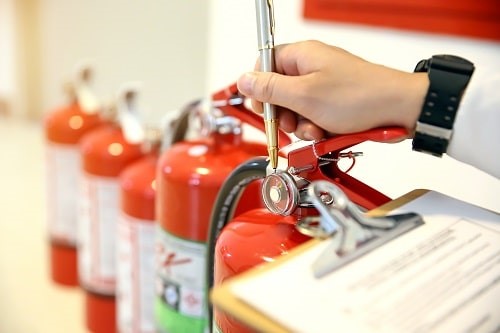By selecting third-party certificated providers of fire safety services, a business can be confident they are getting competent help in managing fire risks.
Features
Competence is crucial
Readers of Safety Management will no doubt be aware, following the Grenfell Tower fire, the construction sector has been scrutinised over how it operates in the interest of life safety.
What is interesting however, is that this scrutiny is now expanding further into the existing built environment. There is now a much greater public and regulatory focus on whether fire safety risks are being properly managed and maintained in all types of occupied buildings, both domestic and commercial.
It is therefore vital that safety managers in charge of all types of buildings are confident they are meeting their legal duty to minimise fire safety risks – especially if they are delegating fire safety tasks to other teams or individuals. This includes employing contractors to undertake tasks like fire risk assessments and install and maintain equipment like fire detection and alarm systems, emergency lighting, and fixed gaseous fire extinguishing systems.
 Justin Maltby-Smith: "To help duty holders identify competent providers of fire safety services, the BAFE Fire Safety Register has developed formal competency schemes."
Justin Maltby-Smith: "To help duty holders identify competent providers of fire safety services, the BAFE Fire Safety Register has developed formal competency schemes."
Understandably, over the last couple of years there has been a huge focus on reducing the risk of Covid infection and spread in locations like workplaces and public buildings. However, the recent focus on Covid may mean duty holders in charge of workplaces and public buildings may have neglected to check and review their fire risk assessments, fire safety management procedures, and fire safety equipment to ensure they are adequate, up-to-date, and working correctly.
It is therefore vital that managers check now whether any of their fire safety measures, arrangements, and equipment need to be re-examined, revised, replaced, repaired, or maintained, using competent fire safety contractors to undertake this work if they themselves do not have the appropriate skills and knowledge.
The term ‘competent’ is used frequently in fire safety guidance, and was, for example, mentioned over 200 times in Dame Judith Hackitt’s report following Grenfell. However, when a duty holder – like a premises manager – wishes to employ external organisations to help them comply with their fire safety legal duties, it can be difficult for them to check and decide if the external service provider is competent.
Competency schemes
To help duty holders identify competent providers of fire safety services, the BAFE Fire Safety Register has developed formal competency schemes under which providers can obtain independent third-party certification by a UKAS-accredited certification body to demonstrate they are competent to offer specific fire safety services.
 The term ‘competent’ is used frequently in fire safety guidance, and was, for example, mentioned over 200 times in Dame Judith Hackitt’s report following Grenfell. Photograph: iStock
The term ‘competent’ is used frequently in fire safety guidance, and was, for example, mentioned over 200 times in Dame Judith Hackitt’s report following Grenfell. Photograph: iStock
There are various BAFE competency schemes under which providers can obtain independent UKAS-accredited third-party certification, including for services like fire risk assessment, and the design, installation, commissioning, and maintenance of equipment like fire detectors and alarms, emergency lighting, and gaseous fire extinguishing systems.
To achieve third-party certification to one of the BAFE competency schemes, the organisation must pass an audit and is then regularly re-assessed (usually on an annual basis) by a UKAS-accredited third-party certification body to ensure they are maintaining the required standard of competence for the fire safety service (or services) they provide. Once an organisation has achieved this, they are subsequently added to the BAFE Fire Safety Register, which is a free and publicly available record of these evidentially competent organisations.
Government guidance (specifically fire safety in the workplace assessment guides) on using providers of fire safety products and services states: “Third-party quality assurance can offer comfort both as a means of satisfying you that goods and services you have purchased are fit for purpose, and as a means of demonstrating that you have complied with the law.”
Therefore, although it is not mandatory to use fire safety organisations that have obtained independent third-party certification of their competence, failing to do so could expose your organisation to unnecessary risk and would not be in line with best practice as laid out by government.
However, once a business has decided to use a third-party certificated fire safety organisation, it is just as important to check they have the appropriate certification for the specific type of work required.
Fire safety organisations that have achieved independent third-party certification of their competence under the BAFE schemes (or from another provider of UKAS accredited third-party certification services), will only be certificated as competent to provide one or more specific fire safety services. It is therefore vital to check they have third-party certification for all the types of the work they will be undertaking.
 The golden thread will provide a chain of accountability showing how those responsible for the building have been managing fire and building safety risks. Photograph: iStock
The golden thread will provide a chain of accountability showing how those responsible for the building have been managing fire and building safety risks. Photograph: iStock
To educate duty holders about the importance of this check, BAFE runs an awareness campaign, ‘Don’t Just Specify, Verify’, and details of how to verify an organisations’ third-party certification under the appropriate BAFE competency scheme are given in the box below.
By performing (and recording) this quick check prior to any work commencing, a business can demonstrate it has exercised full due diligence in checking the competence of those helping it meet its duties under fire safety law.
Golden thread
Under the new building safety regime being introduced for certain high risk buildings following Grenfell, a ‘golden thread’ of information about the fire safety of a building will have to be created and updated throughout the life cycle of a building – from its construction through to occupation and ongoing maintenance.
This will provide a chain of accountability showing how those responsible for the building have been managing fire and building safety risks.
However, in the event of a serious fire safety failing or incident, the decisions taken by those responsible for the building will be closely scrutinised through the golden thread, to check that all appropriate and reasonable measures were taken to reduce the risk to life and property from fire. Therefore, employing fire safety providers who have proved their competency by achieving the appropriate third-party certification will help demonstrate that suitable fire safety measures have been taken and implemented.
As well as BAFE-registered organisations that have achieved UKAS-accredited third-party certification, various other UKAS-accredited third-party certification schemes exist within the fire and wider life safety markets. These also enable providers to demonstrate their competence through an independent audit and certification process.
BAFE therefore recommends that those in control of fire safety in all premises only use UKAS-accredited third-party certificated life safety organisations. This advice applies regardless of an whether organisation uses providers who have been certificated and registered under the relevant BAFE scheme or by another provider of third-party certification.
In fact, in our ‘Don’t Just Specify, Verify’ campaign, we clearly state that other third-party certification registers are available. This is how important we believe that specifying competent, third-party certificated fire safety providers is
to protecting people from fire safety risks in buildings and sites.
Justin Maltby-Smith is Group Managing Director at BAFE Fire Safety Register
For further information on the BAFE competency schemes and the UKAS-accredited certification bodies BAFE works with, see: bafe.org.uk
For further information on the BAFE ‘Don’t Just Specify, Verify’ campaign, and to show your support for this, please complete the form at: bafe.org.uk/djsv
FEATURES

Underpinning safety training with neuroscience for long lasting impact
By SSE Active Training Team (ATT) on 30 November 2025
A behavioural safety training programme developed by Active Training Team for energy provider SSE has been carefully designed with neuroscientific principles in mind – resulting in a prestigious industry award for Best Training Initiative in 2024.

Why a painted line will never be enough
By UK Material Handling Association (UKMHA) on 20 November 2025
Businesses that operate material handling equipment like forklifts are being urged to submit accident and near miss details to a new confidential reporting portal so the industry can identify what needs to be done to improve safety standards.

Why workplace transport training is changing in 2026 and what it means for employers
By AITT on 26 November 2025
New workplace transport training categories due in January mean it is essential to ensure operators of material handling equipment have the necessary training for the exact type of machine they use, and accredited training providers are an ideal source of advice and conversion training.



